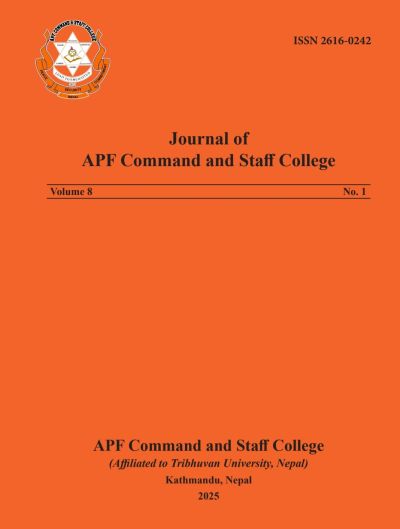Ethical Standards for Promoting Human Rights in Armed Police Force, Nepal
DOI:
https://doi.org/10.3126/japfcsc.v8i1.77604Keywords:
Ethics, ethical standard, human rights, human rights protection, Armed Police Force, NepalAbstract
Armed Police Force, Nepal demonstrates a strong commitment to ethical standards for human rights protection, as evidenced by the implementation of a zero-tolerance policy toward human rights violations, sexual and gender-based violence, corruption, and the adoption of national and international human rights instruments. This study analyzes the role of APF, Nepal in upholding ethical standards for human rights protection and intends to evaluate effective strategies for promoting ethical conduct and human rights within its operational framework. To achieve this, a qualitative case study approach with a descriptive research design has been employed, involving interviews with six key informants to explore ethical policing and human rights issues. Findings reveal that ethical standards are deeply embedded in APF’s operations, ensuring accountability, transparency, and respect for human rights. By implementing human rights training, community engagement initiatives, and modern policing technologies, APF, Nepal fosters public trust and ensures ethical, professional, and legally compliant security operations.The introduction of body-worn cameras, non-lethal weapons, and scenario-based ethical training enhances responsible policing while minimizing excessive force. By strengthening ethical policing practices, APF, Nepal ensures fairness, public confidence, and adherence to human rights frameworks, reinforcing its role as a responsible security force committed to protecting both national security and human dignity which ultimately supports in achieving national aspiration of “Prosperous Nepal, Happy Nepali.”
Downloads
Downloads
Published
How to Cite
Issue
Section
License
Copyright (c) 2025 The Author

This work is licensed under a Creative Commons Attribution 4.0 International License.




